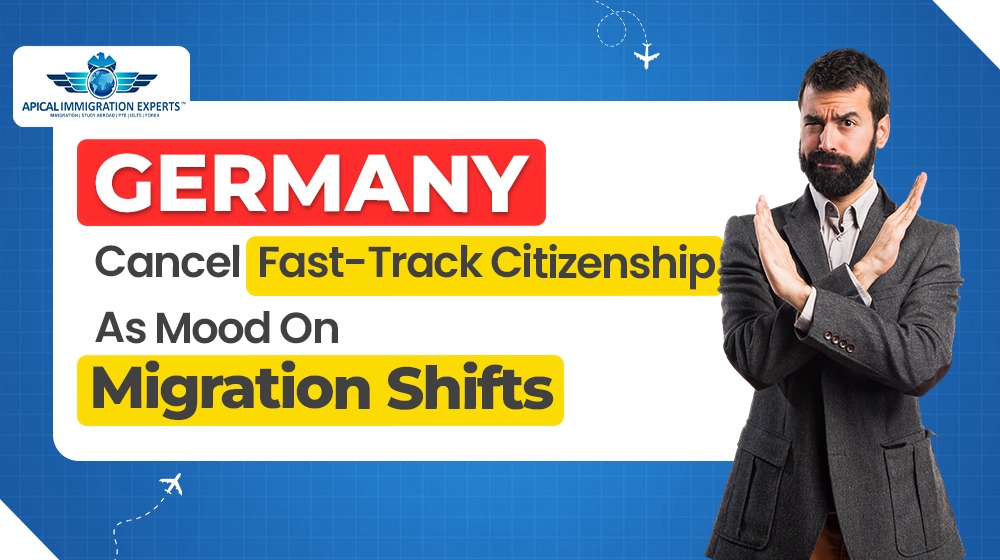
Germany Cancel Fast-Track Citizenship As Mood On Migration Shifts
Germany’s parliament has officially ended the fast-track citizenship program, signaling a major shift in the country’s approach to immigration. The move reflects changing public sentiment towards migration in Europe’s largest economy, which faces both labour shortages and increasing concerns over integration.
Key Highlights:
- Germany ends fast-track citizenship after minimal usage.
- Fast-track applicants required high integration, language, and professional success.
- Conservatives argue citizenship must reward integration, not attract immigration.
- SPD and Greens defend the broader liberalised citizenship law.
- Only a few hundred fast-track naturalisations occurred out of 300,000 in 2024.
- Public attitudes toward migration are becoming more cautious, influencing policy.
Fast-Track Citizenship: What Was It?
The fast-track scheme, introduced under the previous Social Democrat-Liberal-Green government, allowed people considered “exceptionally well integrated” to gain German citizenship in just three years, rather than the standard five.
Applicants had to meet stringent requirements, including advanced German language skills, voluntary service, or notable professional and academic achievements. The policy was intended to attract highly skilled migrants and international talent to Germany, a nation grappling with demographic challenges and a shortage of workers in key sectors.
Political Motives Behind the Repeal
Chancellor Friedrich Merz’s conservative coalition had pledged during the election campaign to scrap the fast-track scheme. Interior Minister Alexander Dobrindt defended the decision in parliament, stating:
“A German passport must come as recognition of a successful integration process and not act as an incentive for illegal immigration.”
While the fast-track provision has been removed, the broader citizenship law largely remains in place. Other features of the law, including the general waiting period reduction from eight to five years and the acceptance of dual citizenship, are still intact.
SPD and Greens Respond
The Social Democratic Party (SPD), now a junior partner in Merz’s coalition, supported the repeal, noting that the fast-track pathway was rarely utilized. Of the record 300,000 naturalisations in 2024, only a few hundred were processed through the fast-track program. SPD representatives stressed that the essence of the 2019 citizenship reforms—making naturalisation more accessible and flexible—remains unaffected.
Meanwhile, Green Party legislator Filiz Polat emphasized Germany’s ongoing need to attract skilled professionals:
“Germany is in competition to get the best minds in the world. If they choose Germany, we should do everything possible to retain them.”
The Fast-Track’s Limited Impact
Although politically contentious, the fast-track pathway had a minimal real-world impact. It was designed as an incentive for highly mobile, skilled individuals to settle in Germany. However, its usage remained low, and most naturalisations continued through the standard five-year route.
Candidates seeking fast-track citizenship needed to demonstrate exceptional integration. This could include high-level German language proficiency, voluntary community work, or exceptional academic or professional accomplishments. The program was seen as a tool to attract top talent but was perceived by some conservatives as potentially encouraging immigration solely for citizenship purposes.
Changing Public Attitudes on Immigration
Germany’s public sentiment towards migration has shifted dramatically in recent years. The influx of migrants in previous years strained local services and infrastructure, fueling debates about integration, housing, and social support.
This change in mood has also influenced politics, with the far-right Alternative for Germany (AfD) gaining stronger support in some polls. The cancellation of the fast-track citizenship scheme reflects a broader trend in which policymakers are balancing labour market needs with public concerns about migration and social cohesion.
Why the Government Made the Change
Conservative lawmakers argue that citizenship should be a reward for successful integration, not a tool to attract foreign workers. By rescinding the fast-track option, the government aims to ensure that naturalisation is based on long-term engagement with German society, rather than expedited processing for professional advantages.
The SPD and Greens, while supporting parts of the reform, continue to advocate for policies that retain Germany’s global competitiveness, especially in attracting high-skilled talent. Their position highlights the delicate balance between immigration control and economic necessity.
What This Means for Migrants
For most prospective citizens, the standard five-year naturalisation process remains unchanged. The repeal primarily affects a small group of highly skilled applicants who might have qualified for expedited citizenship.
Experts suggest that Germany will continue to seek international talent, but future initiatives may focus more on long-term integration rather than rapid citizenship. This could include language programs, employment support, and community engagement initiatives.
Looking Ahead
Germany’s decision to cancel fast-track citizenship illustrates the country’s evolving approach to migration. While there is still a need for skilled workers to support its economy, public opinion and political pressures are shaping a more cautious approach to immigration and integration policies.
As Germany navigates labour shortages, demographic challenges, and social cohesion, policymakers are likely to continue adjusting migration laws to balance economic interests with public sentiment.
Stay Updated on Germany Immigration
Subscribe to the latest Germany immigration news – never miss updates on visas, policies, and programs.
Free Profile Assessment – Fill out our form and take the first step toward your German immigration journey.
Online Consultations Available – Connect with our experts anytime, from anywhere.
Email: info@immigrationxperts.com Call us: +91-9999467686, +91-8447-696555Expert Guidance – Schedule a session to get answers to all your Germany immigration questions.





